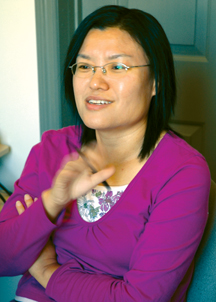A fair shake: South Korean activists seek “mini-WTO protest” at trade talks
Reacl Change News (USA) | September 1, 2006
A Fair Shake
South Korean activists seek “mini-WTO protest” at trade talks
By CYDNEY GILLIS
Staff Reporter
The mass protests that took place against the World Trade Organization in 1999 might stop some nations from scheduling a round of free-trade talks in Seattle.
But not South Korea.

Next week, a delegation of 150 South Korean trade and industry officials are scheduled to join their American counterparts in Seattle to negotiate a Korea-U.S. Free Trade Agreement. While they’re talking at the Washington State Convention and Trade Center Sept. 6-9, activists from South Korea and across the U.S. plan a mini-WTO protest of downtown marches, rallies, and other events.
It will be the third round of talks on the treaty, which is aimed at lifting tariffs and restrictions to boost trade with South Korea, the United States’ seventh-largest trading partner. But protest organizers say the proposals under discussion will only hurt South Korea’s factory workers, rice farmers, ranchers, and film industry.
“We call our free trade agreement NAFTA-plus. It’s worse than NAFTA,” says Aehwa Kim of the North American Free Trade Agreement.
Kim is a labor organizer from South Korea who’s been working at the Seattle offices of LELO, the Northwest Law and Employment Office, to turn out labor and other groups for the protests. She is with the Korean Alliance Against KorUS FTA, a coalition of 282 trade, professional, and women’s groups that oppose the treaty. The group staged previous protests at treaty talks held in June and July in Washington, D.C., and Seoul.
Like NAFTA, Kim says, the treaty would benefit U.S.-based multinationals at the expense of Korean workers and family farmers. Factory jobs would be outsourced to other Asia countries where labor is cheaper, and rice and other farm products would flood the South Korean market at prices farmers couldn’t compete with.
“The government says if we succeed with the free trade agreement, our exporting will be increased,” Kim says. “But even [automaker] Hyundai says that maybe there will be an increase, but the amount will be very small.”
Even if exports do go up, that doesn’t mean more jobs or higher wages for Koreans, says Cheehyung Kim of Koreans Against War and Neoliberalism, a U.S.-based group that is co-organizing the Seattle protests.
“Hyundai hardly makes its cars in Korea anymore,” he says. “It makes parts in various places where wages are cheaper,” such as Thailand and the Philipines.
Any jobs that would be created, says Aehwa Kim, will continue to follow the trend of “casualization” - converting full-time jobs to part-time ones with no protections or benefits.
On paper, she says, the WTO and free-trade agreements respect labor rights, “but they don’t say anything about casualization. That’s a problem.”
Bill Center, president the Washington Council on International Trade, which is hosting the talks, was unavailable for comment.
The two Kims (who are not related) also point out that, just to get to the negotiating table, the South Korean government agreed to four U.S. demands without any public process. Among them, the government resumed importing American beef (which had stopped after the mad cow scare), allowed more Hollywood films to be shown in its theaters, and lifted price controls on medications.
If the trade agreement goes through, greater foreign investment could spell the end of Korea’s cheap generic drugs and national health insurance, says Cheehyung Kim.
“Korean ownership will lose out,” he says. “What follows that is privatization of state-owned industry, including the railroads and health insurance.”
“The single most important thing,” he adds, “is that the government is letting go of responsibility for the welfare of its people and letting the corporations control the welfare of the people.”
South Korea and the United States plan to finish their negotiations by March of next year. But Aehwa Kim says it won’t be without a fight.
“At the beginning of this year,” she says, a poll showed that “75 percent [of South Koreans] said, yes, they were for the free trade agreement. But, at the time, we didn’t have any information.”
“Now 55 percent of the people say no,” she adds. “That was our work.”
[Events]
South Korea-U.S. trade talks take place Sept. 6-9 in Seattle. Protests start Wed., Sept. 6, with a rally at Westlake Plaza (12:30 p.m.) and concert (6:30 p.m.) On Sept. 8, a traditional Korean protest march (“Three Steps Forward, One Bow”) starts 1 p.m. at Westlake. On Sept. 9, a Korean funeral march leaves the convention center at 1 p.m. for Victor Steinbrueck Park for a closing rally at 2 p.m.
[Resources]
For information on South Korea - U.S. trade negotiations, go to www.nofta.or.kr/en/





